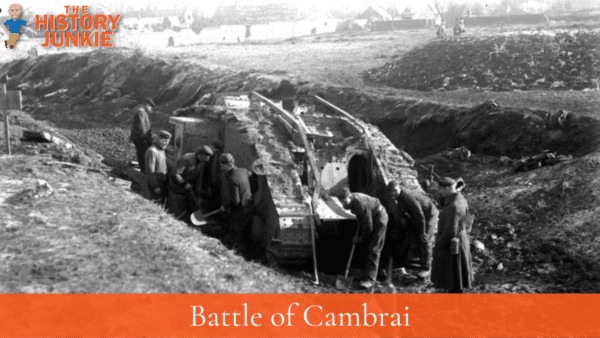The Battle of Cambrai, which started in November 1917, was the first time tanks were used in a big way, more than a year after they had first appeared at Flers on the Somme in September 1916.

Jump to:
Prelude
By the fall of 1917, people did not think tanks were very effective. They thought they were good for surprising the enemy at first but not very useful for attacking, and they were hard to control and often broke down.
The German leaders, who were terrified at first when they saw the big machines on the battlefield, soon came to look down on the tank as something they could easily destroy with their field artillery. They did not work much on making their own tanks until late in the war.
But the British Tank Corps still believed that the tank would do better if it were used in better conditions than the muddy mess that was the Third Battle of Ypres, where the tank had only made people more doubtful.
So Lieutenant-Colonel John Fuller of the Tank Corps suggested using a lot of tanks on the dry battlefield between the Canal du Nord and the St. Quentin Canal.
Third Army commander Julian Byng - who was in charge there - liked Fuller’s idea, but British Commander-in-Chief Sir Douglas Haig said no because he wanted to keep fighting at Passchendaele.
But later, Haig, who was not happy with how things were going at Passchendaele, came back to Fuller and Byng’s plan because he liked the idea of winning a big battle with the new weapon before the year ended.
Byng, who was happy with the chance he got, did not agree with Colonel Fuller’s first plan to pull back right after the tanks had raided the German lines. He wanted to make a big breakthrough instead.
He planned the attack for November, even though it was getting colder and wetter. The Tank Corps commanders were worried that the attack would only make people think worse of the tank as an attacking weapon.
The Battle
The attack started at dawn on November 20, 1917, with all the tanks they had moving across a 6-mile front. 476 tanks were joined by six infantry and two cavalry divisions (to use any breakthrough) and another 1,000 guns.
14 new squadrons of the Royal Flying Corps were ready - this was like what the German army did very well in the Second World War. There was no bombardment before the attack, so it was a complete surprise.
The German Second Army, led by Georg von der Marwitz, was facing the British attack. In a few hours, they were pushed back about 4 miles to Cambrai, and the three trench systems of the Hindenburg Line were broken for the first time in the war.
The British did well everywhere except at Flesquieres (in the middle of the attack), where 51st Highland divisional commander Harper did not want to work with tank commanders because he did not trust tank technology. They took about 8,000 prisoners and 100 guns on the first day alone.
Haig was very happy (and very surprised) by how much they got on the first day, and he wanted to keep attacking, but it was harder to get more after the surprise was gone; still, they took Flesquieres the next day. But Byng did not have enough support to follow up on the breakthrough of the first day, and he lost his chance.
Erich Ludendorff, who was really in charge of the German Third Supreme Command, wanted to counter-attack right away, but he found out that he could not get reserves for two more days. He even thought about pulling back from the Cambrai front.
Marwitz, who was the commander there, was shocked by the attack on November 20. But he kept sending German attacks, starting November 20, to get back all the ground he had lost to the British.
He used 20 divisions in the German counter-attack, which used new tactics called Hutier infiltration tactics (after the German commander who had used them first, Oskar von Hutier). In a week, he had almost got back everything he had lost.
Conclusion
The battle was very bloody: the Germans lost about 50,000 men and the British 45,000. Even if using a lot of tanks did not work as they wanted, it still showed that the tank could be good for attacking.
In Britain, people heard about the big breakthrough at first, and they liked Byng a lot, and they rang church bells in Britain for the first time in the war.
